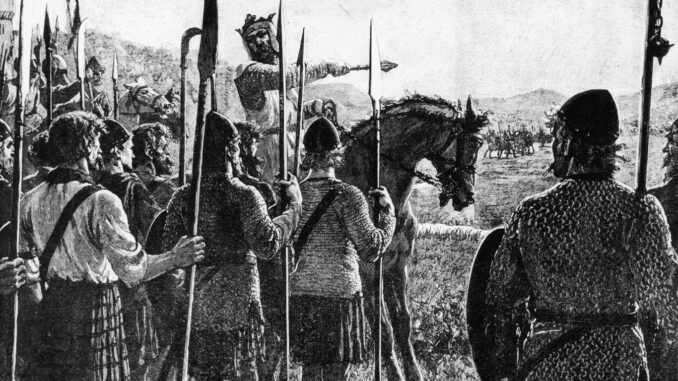
[ad_1]
From our vantage point in the 21st century, it might seem incredible that the leader of a nation would place himself or herself in harm’s way in a battle. But what seems unbelievable now was commonly required of sovereigns from the beginning of written history until around the mid-18th century. (These sovereigns sometimes proved to be among the most legendary warriors in history.)
To find the kings – including emperors, sultans, and other supreme heads of state – who led their own armies, 24/7 Tempo used resources such as Britannica, History Collection, New World Encyclopedia, World Historyand Royal.UKthe official website of the British royal family. The degree of each monarch’s participation in actual hand-to-hand fighting varies. In some cases, the kings were literally in the thick of battle; in others, they were more likely to be present in a supervisory or inspirational capacity. The battles listed are not necessarily the only ones these men engaged in.
Monarchs, whose power was often derived from their direct command of the military, took part in conflicts because the troops they led needed a flesh-and-blood reason to fight. Sovereigns had to demonstrate their courage and their presence served as a rallying point, and if they had a reputation for military skill, that would help build troops’ confidence in combat. In addition, soldiers often believed that they would be rewarded by their monarch if he saw them demonstrating bravery in battle, so would be motivated to fight harder.
Click here to see warrior kings who led their own armies
This began to change with the advent of firearms, which put sovereigns in greater peril on the battlefield. Another factor was the increased professionalization of the militaries, as officer corps were created and their ranks were populated based on merit, at least in theory.
By the 18th century, too, succession in the royal houses of Europe had become more stable, and some nations evolved into constitutional monarchies where the sovereign’s role would be circumscribed. (These are the 20 longest reigning monarchs in history.)
With the notable exception of Napoleon Bonaparte, by the early 19th century, the days of a king at the head of an army marching across the landscape were over. The culture had changed as well, as nations expected their leaders to be competent at governing and leave the business of war to the generals.
Sponsored: Tips for Investing
A financial advisor can help you understand the advantages and disadvantages of investment properties. Finding a qualified financial advisor doesn’t have to be hard. SmartAsset’s free tool matches you with up to three financial advisors who serve your area, and you can interview your advisor matches at no cost to decide which one is right for you. If you’re ready to find an advisor who can help you achieve your financial goals, get started now.
Investing in real estate can diversify your portfolio. But expanding your horizons may add additional costs. If you’re an investor looking to minimize expenses, consider checking out online brokerages. They often offer low investment fees, helping you maximize your profit.

Leave a Reply